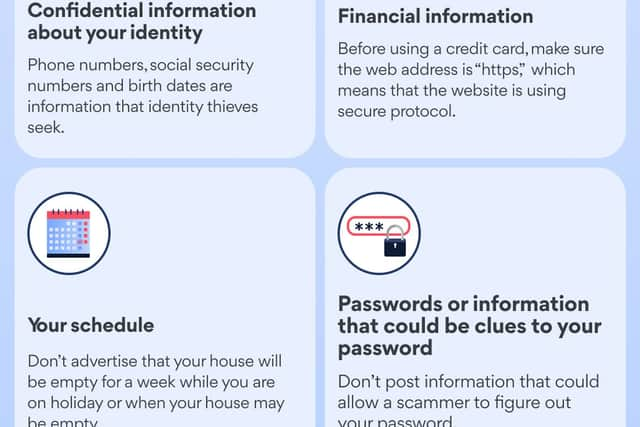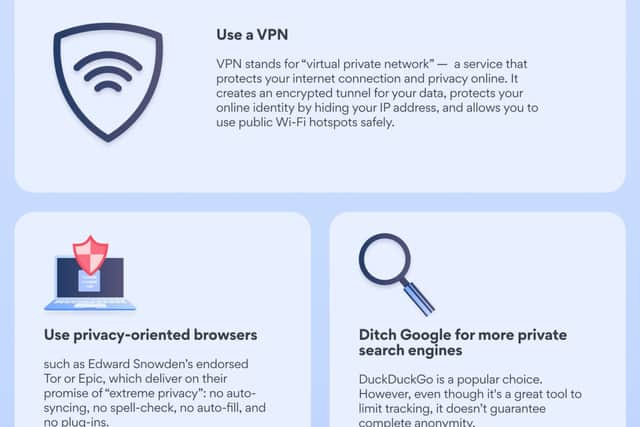The top ways people make themselves trackable - from using public Wi-Fi to sharing fitness achievements online
This article contains affiliate links. We may earn a small commission on items purchased through this article, but that does not affect our editorial judgement.


Accepting cookies, using public Wi-Fi and even having a smart washing machine are just some of the ways people are making themselves ‘trackable’, according to experts.
Others are also guilty of signing up to mailing lists, sharing fitness achievements via apps and using Wi-Fi when out, which can result in personal details being accessed by others.
Advertisement
Hide AdAdvertisement
Hide AdExperts revealed people can be tracked by almost all devices connected to the internet, due to being embedded with technology such as processing chips, software and sensors which collect data.
All objects connected via the internet are typically monitored and controlled remotely, including smart watches, tablets, laptops and even doorbells.
And devices which are equipped with voice command capabilities can listen to and record conversations.
NordVPN’s digital privacy expert Daniel Markuson also revealed how dangerous public Wi-Fi is – which essentially gets people online in exchange for valuable sign-on data such as email addresses, social media profiles and phone numbers.


Giving away personal details while using public Wi-Fi
The insights come after a study of 2,000 adults found one in eight use public Wi-Fi as often as once a day, while 15 per cent do so several times a week.
Almost four in 10 have used social media channels with auto log in while connected to public Wi-Fi and 37 per cent have logged into their personal emails.
More than a quarter have also filled in a form with personal details such as their name, address or phone number, and 24 per cent have used an online banking app via public Wi-Fi.
The most popular places to log on were found to be hotels (47 per cent), eateries (47 per cent) and airports (37 per cent).
Advertisement
Hide AdAdvertisement
Hide AdWorryingly, 24 per cent feel their data is generally secure when using public Wi-Fi, but experts warned the convenience comes at a price of people’s personal data and privacy.
Daniel said: “When you use ‘free’ Wi-Fi there’s a good chance it’s managed by a third-party provider which gets you online in exchange for your valuable sign-on data.
“What might surprise you is that some hotspot providers are taking data collection a step further and quietly tracking millions of users’ whereabouts even after they’ve left the establishment.
“Using a VPN creates an encrypted tunnel for your data, protects your online identity by hiding your IP address and allows you to use public Wi-Fi hotspots safely.
“Another area where people often get caught out is accepting cookies – they can track and collect data from your browser and send that data back to the website owner – and if you don’t ‘decline’ third party cookies the website can sell your browsing data to third parties.”


Concerns about being tracked online
The study also found 22 per cent ‘always’ accept cookies and 35 per cent do so ‘unless it looks suspicious’ – only four per cent ‘never’ accept.
Almost two thirds trust their internet service provider to keep their information safe but 84 per cent are worried about being tracked online.
People believe it’s possible to be tracked by their mobile phone (73 per cent), laptop (69 per cent) and desktop computer (67 per cent) but are less convinced that their smart home devices can do so.
Advertisement
Hide AdAdvertisement
Hide AdBut Daniel warned information about when various appliances are used such as lights being switched on and off, doors being opened and energy consumption fluctuating can be a real treasure trove to a potential attacker.
The survey also found people are most afraid of their banking information, passwords and address being hacked from their devices, yet 38 per cent admitted to using the same password across their devices and accounts.
And more than a third have their bank login details saved to their phone or computer while 23 per cent share their fitness achievements via apps.
Almost half believe apps ask for more information than should be required and 46 per cent think devices listen to them.
Worryingly, 31 per cent of those polled via OnePoll have been hacked in the past.
Daniel added: “The study shows how many people are oblivious to the ways they can be tracked and hacked online.
“Using public Wi-Fi, accepting cookies and owning wearable smart devices are things we all do in life without necessarily thinking of the consequences.
“We’re keen to educate people on the dangers and how they can protect themselves with a VPN.”
To find out how you could be getting tracked and top tips on how to stay safe, click here.